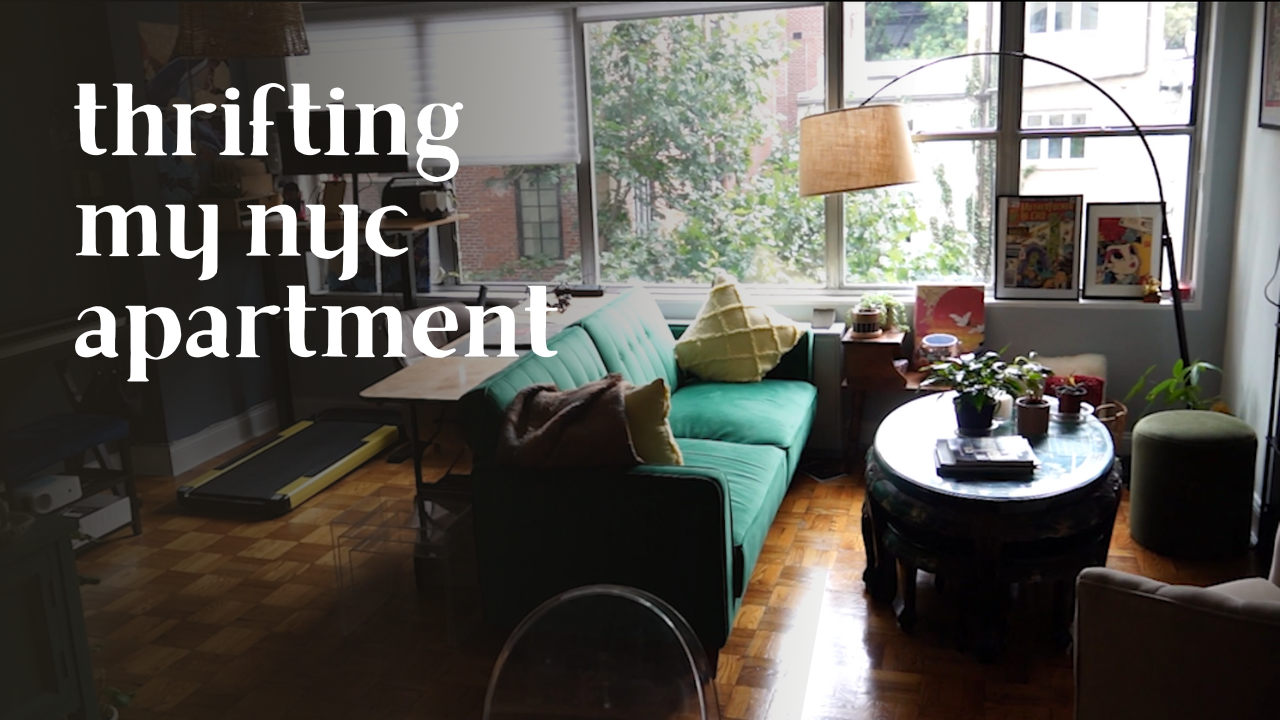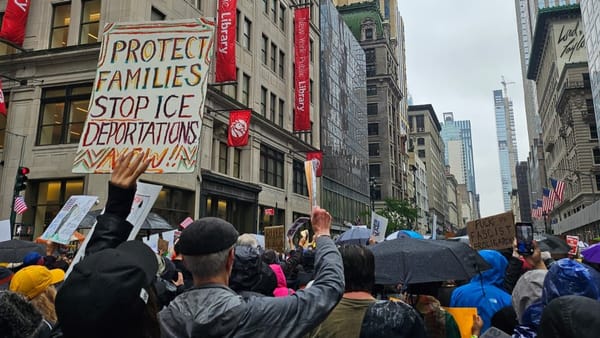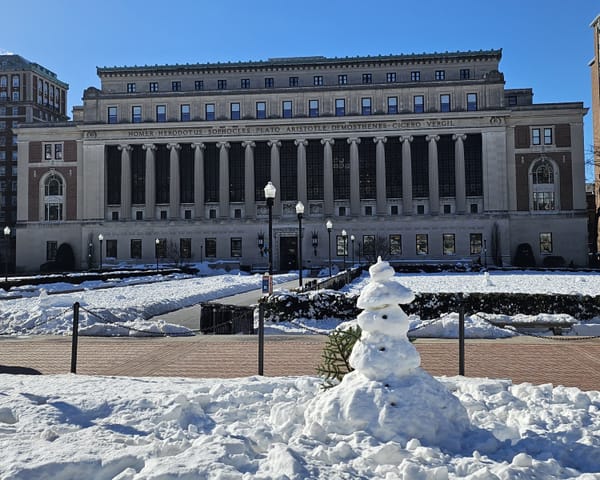02.21 | my very messy thrifted nyc apartment
Consumerism and waste cycles are topics that are really near and dear to my heart, and when I got to New York, I tried to be as mindful as possible to not buy into a culture of over-shopping.

I wish I was one of those people who clean as they go, who are models of organization and clarity, but I'm just not. If I find myself with a piece of paper in my hand, and I'm unsure where to put it, I lay it down on the nearest surface and hope it folds itself into a paper plane and flies wherever it's supposed to go.
– Abi Waxman
✉️ letter #55
Oh my god a new video, and one that's actually about what I say my Youtube channel is supposed to be about!
I decided after COVID to try to center my me-focused projects on a silver ring of what I ultimately wanted for my life: a chance to chew over what it truly means to live ethically in this day and age, and then do it. Basically, inhabit the work of understanding why our world is the way it is now, why I think it's wrong or right, and what everyone can be doing to improve it.
For the most part, I think I've been successful at turning my newsletter into that kind of space. But because of the amount of effort it takes to write, film, and edit the Youtube channel, I often end up using my energy on there to just talk about something that's been more prominently irking me (usually my own silly little brain).
Occasionally though, I get it together! Consumerism and waste cycles are topics that are really near and dear to my heart, and when I got to New York, I tried to be as mindful as possible to not buy into a culture of over-shopping. This included for my house - I need new furniture, and I need to live in a nice looking space - but I wanted to see how much of what I needed I could rescue from going into landfill. I was pretty successful, I think! I'd say that a good 85% of the big items in my house are thrifted.
Take a look at how I did it:
Yes, if you can't tell from my hair, this was all filmed before I left for wintering in Shanghai. In case you needed more evidence as to how chaotic my life had become in my last couple of months at The China Project, I did not realize how much of a mess my apartment was in when I started filming.
It was only after rewatching my little talking head inserts that I screamed, "Jesus, you couldn't have cleared your table before showing it to the world, Elaine? Is that a JACKET hanging on your bookshelf that you didn't put away? Did everyone really need to see what a pig sty your living room can become?"
Ah well. Call it being truly authentic, I guess.
🎼 the soundtrack | Padam Padam - Kylie Minogue
She's 55 years old but still churning out hits that you know all the young drag queens are going to be doing routines to. Slay.
🌱 the green light | an eco-focused newsreel
Similar to how we barely talked about the environmental impact of cryptocurrency as it gained momentum, very little has been published on the ecological costs of Generative AI.
Not only do we not have enough electric power to actually turn on what ambitious companies expect us to use in a few years (something OpenAI's Sam Altman addressed recently), AI systems need enormous amounts of fresh water to cool their processors. From Nature Magazine:
A lawsuit by local residents [in Des Moines, Iowa] revealed that in July 2022, the month before OpenAI finished training the model, the cluster used about 6% of the district’s water. As Google and Microsoft prepared their Bard and Bing large language models, both had major spikes in water use — increases of 20% and 34%, respectively, in one year, according to the companies’ environmental reports. One preprint suggests that, globally, the demand for water for AI could be half that of the United Kingdom by 2027. In another, Facebook AI researchers called the environmental effects of the industry’s pursuit of scale the “elephant in the room”.
The Nature article notes that there are now some movements from within Congress to figure out what exactly the environmental impacts of Artificial Intelligence will be. But there's no indication of what could happen if those impacts are unacceptably astronomical.
- "Many of the same fossil fuel companies that knew and lied about how their oil and gas products cause climate change have also known and lied for decades about how another one of their core products — plastics — will never be recycled at scale." [Center for Climate Integrity]
- The Environmental Defense Fund has developed a mapping tool that allows users to "explore social, environmental, economic, and health conditions of every census tract in the U.S." - useful for seeing how economic inequity also leads to climate vulnerability inequity. [Grist]
- It keeps on raining in the Arctic now, and that's horrifying. [Yale e360]
🪢assorted | food for thought from around the internet
The United States has killed another ceasefire resolution in the United Nations over GAZA, saying it would "harm truce negotiations between Israel and Hamas," according to Al Jazeera.
This is the third time it has blocked such measures since Israel began attacking. The United States was the only country out of the Security Council's 13 - this time, the United Kingdom abstained.
I went into how it felt to hop from one country committing a genocide into another one condemning Country 1's genocide while enabling an even larger-scale genocide back during Thanksgiving, a little less than two months out from the original Oct 7 attacks.
It's now been three more months, another 20,000 Palestinians are dead, and the debate about whether not supporting Israel is "antisemitic" seems to be going around the same circles here over and over again. I find that line of argument more and more ridiculous the more of Palestine I see destroyed, but then again, I also found it ridiculous back in November. As if there was an acceptable ratio to children bombed by a government versus hostages taken by a terrorist that we just hadn't reached yet. As if the Israeli government even acts like it wants the hostages back.
Anyway, multiple articles about how to support Palestine include the act of just continuing to talk about it, so I'm using this space this time to talk about it:
- Actors and screenwriters are being penalized for their stances on Palestine. One TV showrunner argues that it's not that he's against criticism of Israel, he just feels like these people protesting don't talk enough about the hostages. Which I guess is why so many activists feel the need to start out their pleas to stop a genocide with "obviously, it's wrong to kidnap and murder people, like what Hamas did, in case we weren't all aware or in case us being horrified at more kidnap and murder insinuates we think the first act was okay." [The Guardian]
- Kind of ironically, in its support for Israel, Germany is arresting an outsized number of Jews who are protesting for peace. [LA Times]
- Related: Berlin's cultural senator has announced that public funding for artists will depend on a loyalty oath for Israel - a bizarre act on top of many of bizarre acts that make it so that German aristocrats with very high-up Nazi backgrounds can present themselves as "victims of antisemitism" even if it's a Jewish person criticizing them on this issue. [The Left Berlin]
- Palestinian activists reporting from the front lines that you should know: Motaz Azaiza, Bisan Owda, Plestia Alaqad, Hind Khoudary and the veteran journalist Wael al-Dahdouh. A lot of their videos have been on my social feeds and... well, fair warning, they're not easy to watch. I imagine they're even harder to live through. [The Guardian]
- Upcoming protests around the world for demanding a ceasefire are listed on the Palestine Resource Guide, generally a good crowd-sourced internet trove for any way to help. The biggest is probably going to be another "Global Day of Action" on March 2. [Palestine Resource Guide]
✨enjoying: one final piece of pop culture fun
Is this vandalism? Yeah, probably. But is it also the coolest thing I've seen out of urban art in a long time? Absolutely. Ahead of the Grammy's earlier this month, taggers covered at least 27 stories of an unfinished high-rise right next to the Crypto.com Arena where the awards were being held.
The towers were originally owned by Beijing-based developer China Oceanwide, which ran out of money to complete the building.
The city's now blaming them for not putting enough safety around the structure, but quite honestly, I'd say that a system that lets developers build luxury towers without a solid guarantee to finish them is more at fault.
I get that it's "better business" to fast-track developments, and in years where everyone's flush with cash, maybe it seems "burdensome" to have financial regulators dig deep into investigations on where the money for a billion dollar project is coming from.
But this keeps happening. We keep going through another crisis, writing in a little bit of regulation to try and stop another crisis from happening, and then dismantling those regulations because we're in boom times again. As a Millennial who's gone through countless "once in a lifetime" boom busts since I was old enough to read news, it's hard not to feel like the world - or specifically America - has deliberately chosen to short circuit its own memory.
At least this time, we get some absolutely stunning art alongside the late capitalism decay.
Stalk me on Social Media
Instagram | TikTok | LinkedIN | Twitter | Goodreads | Spotify




